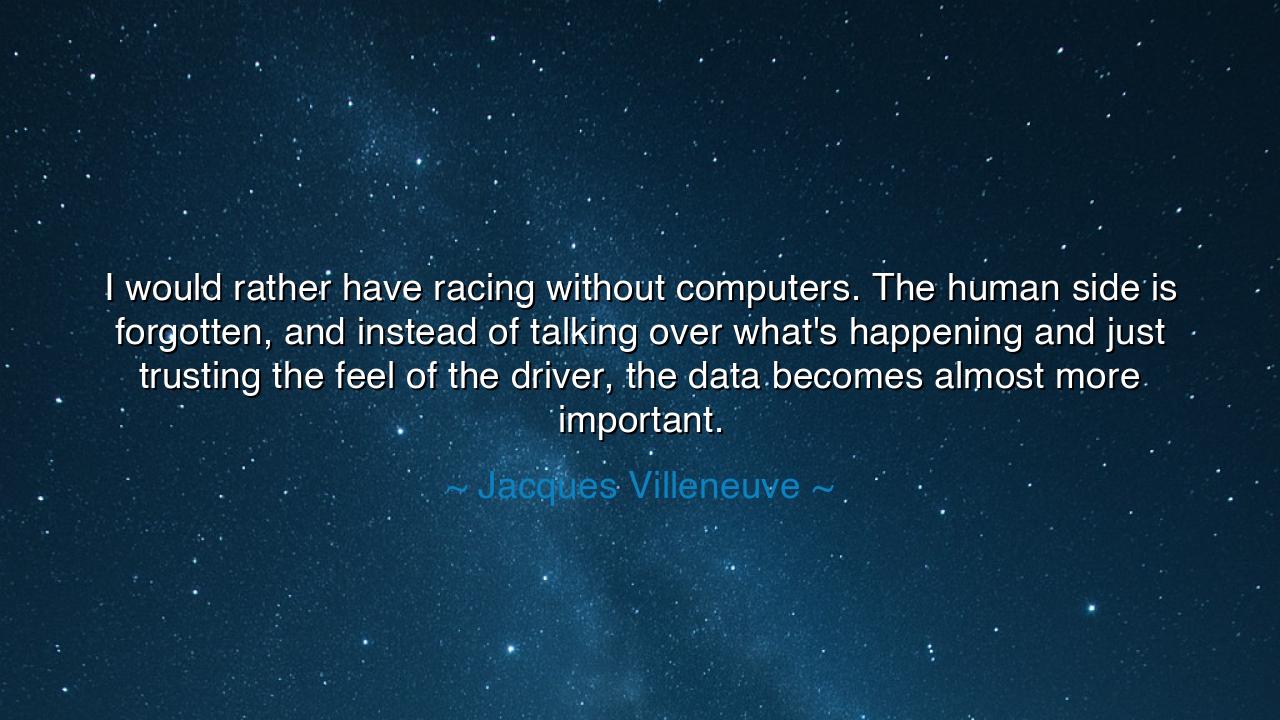
I would rather have racing without computers. The human side is
I would rather have racing without computers. The human side is forgotten, and instead of talking over what's happening and just trusting the feel of the driver, the data becomes almost more important.






There are words that speak not only of sport, but of the essence of humanity itself. Among such words are those of Jacques Villeneuve, the champion racer and philosopher of the track, who declared: “I would rather have racing without computers. The human side is forgotten, and instead of talking over what's happening and just trusting the feel of the driver, the data becomes almost more important.” Beneath the surface of his reflection lies a truth older than any machine — a truth about instinct, spirit, and the quiet intelligence that lives not in numbers, but in the heart. Villeneuve speaks not only for racers, but for all who labor in a world increasingly ruled by the cold precision of data rather than the living pulse of experience.
The meaning of this quote reaches beyond the roaring circuits of Formula One. It is a lament for the vanishing human touch in an age that measures everything but understands little. Villeneuve, a man born into speed and raised in the shadow of his legendary father, speaks from a place of deep intimacy with the art of racing — a craft that once depended on the raw connection between man and machine, between instinct and asphalt. In his eyes, the rise of computers and data analytics has dulled that sacred bond. Where once the driver relied on feel — the vibration through the wheel, the scent of fuel, the tremor of the tires — now he is told what to think by streams of numbers and graphs. The driver becomes not a master of the car, but a servant to the algorithm.
The origin of Villeneuve’s words comes from his own racing career — a time when the sport stood on the border between two eras. The late 1990s saw the dawn of advanced telemetry, sensors, and computers that could measure every heartbeat of a car’s performance. Engineers began to dictate strategy not from the pit wall of intuition, but from computer screens glowing with analysis. Villeneuve, who came from an age of courage and instinct, resisted this transformation. He longed for the days when victory was not calculated but felt — when triumph was born from risk, not prediction. His lament is not against progress itself, but against the loss of soul that progress often brings when man forgets he is more than the sum of his tools.
This conflict between intuition and machinery has echoed throughout history. In the days of old, the archer who trusted his eye and the samurai who listened to the whisper of his blade were artists as much as warriors. But when the gun replaced the sword, skill gave way to mechanism; precision replaced mastery of the self. So too in our age, Villeneuve warns, the computer risks replacing the human spirit. Just as an archer’s heart guided his aim, so must a driver’s heart guide his race. Without that communion, sport becomes sterile — a contest not of will, but of calculation.
There is an ancient lesson in this struggle. The Greeks spoke of techne — the art of doing — as something that united the body, mind, and spirit. It was not enough to know the technique; one had to feel the essence of the act. A sculptor could not rely on geometry alone; he had to sense the life within the marble. Likewise, Villeneuve reminds us that true mastery, whether in art, sport, or life, comes from the fusion of knowledge and intuition. When we replace intuition with data, we may gain efficiency but lose meaning. The human element — imperfect, unpredictable, divine — is what gives beauty to action and depth to achievement.
Yet, Villeneuve’s message is not one of rejection, but of balance. He does not call for the destruction of machines, but for their submission to humanity. The car must serve the driver, not rule him; the computer must guide, not command. In all crafts — from racing to medicine, from art to engineering — technology is a powerful ally, but a dangerous master. The wisdom lies in knowing where to draw the line: to use data as a compass, but never as the soul. For it is the heart, not the code, that drives greatness.
So let his words be a warning and a guide to all who live in this digital age. Do not surrender your instincts to the numbers. Do not let the hum of the machine drown out the whisper of your inner knowing. Whether you drive a racecar, paint a canvas, or build a world, remember that feeling is the truest form of intelligence. Villeneuve’s cry is a call to restore the human spirit to its rightful throne — to remember that the most profound victories are not calculated, but lived.
And thus, O listener, take this lesson with you: in the age of computers, remain human. Use your tools, but trust your senses. Learn from data, but listen to the pulse within your chest. For while machines may teach us precision, only the heart can teach us courage — and it is courage, not code, that wins every race worth running.






AAdministratorAdministrator
Welcome, honored guests. Please leave a comment, we will respond soon